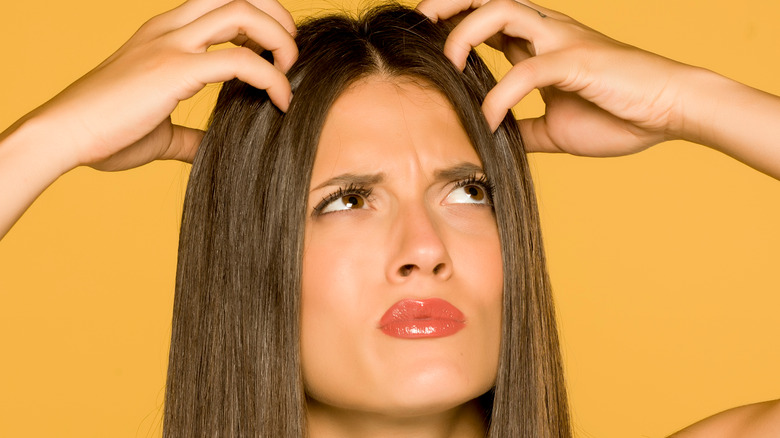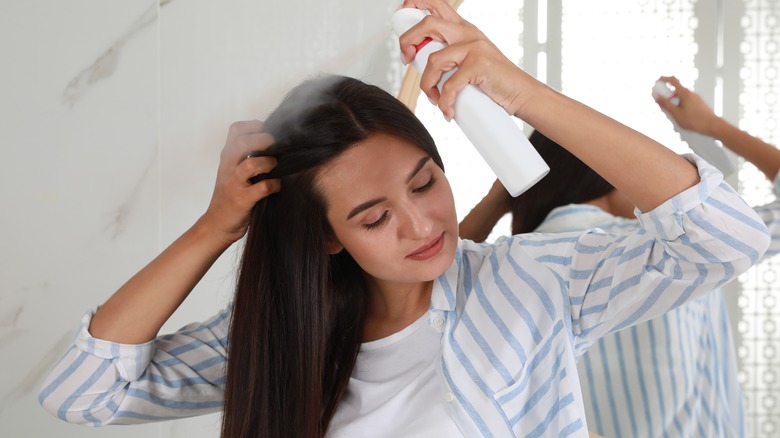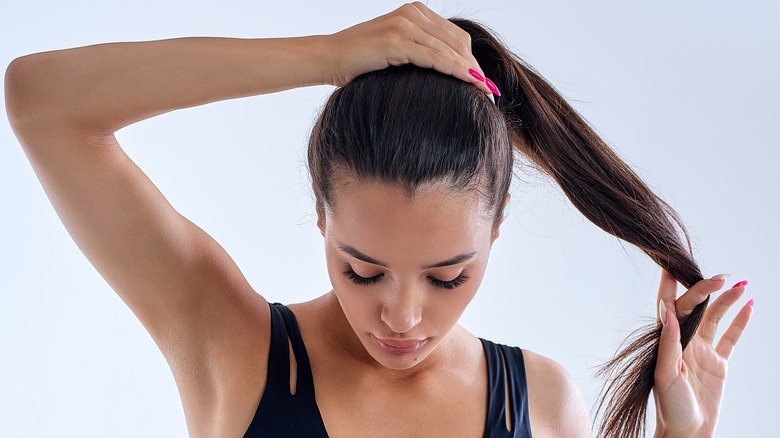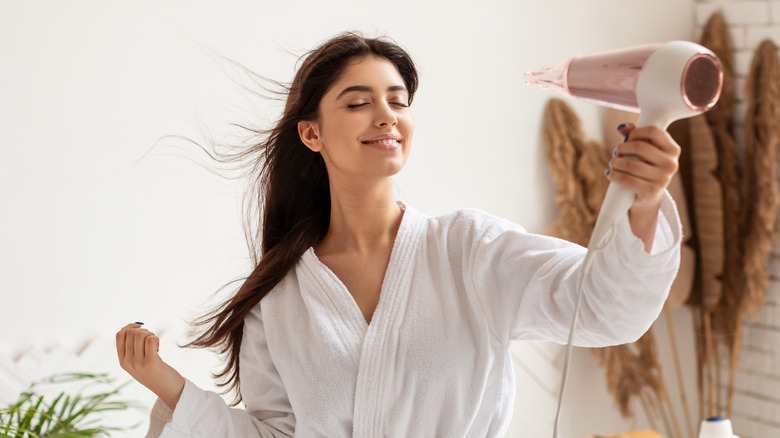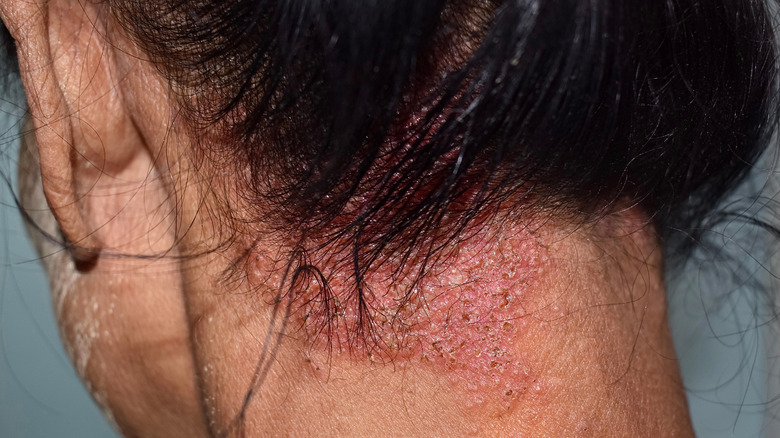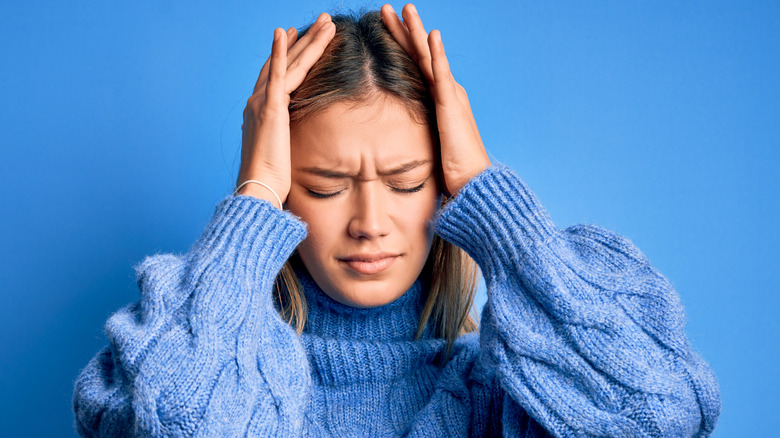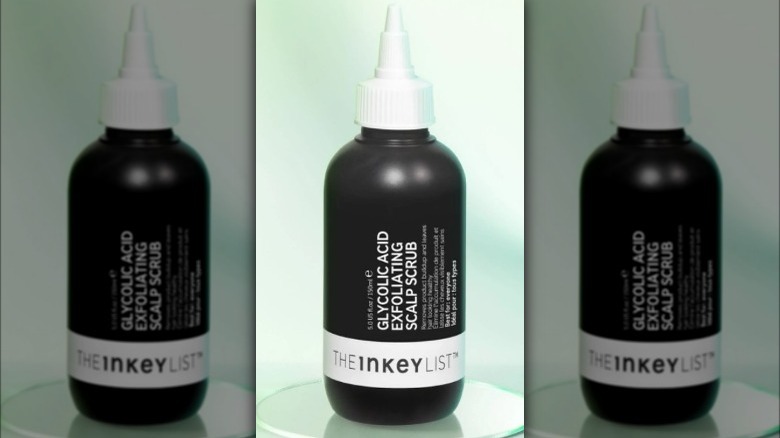What It Means If Your Scalp Hurts
We may receive a commission on purchases made from links.
Our hair gets so much love from fancy shampoos, conditioners, and hair masks to keep it healthy and luscious. However, most of these items only treat your hair and not your roots. If you want your hair to look its best, you need to focus on your roots and your scalp where your hair grows from.
Trichologist Anabel Kingsley, who works at Philip Kingsley, told Harper's Bazaar, "Scalp health definitely impacts hair health." She added that when your scalp is healthy, it gives your hair "a healthy base" to grow from. With more people becoming aware of the importance of scalp care, many skincare brands are making products designed solely to take care of this finicky area. If you take care of the skin on your face and body, why not give some love to the scalp too?
Trichologist Bridgette Hill, who is from New York City and is commonly referred to as The Scalp Therapist, told Vogue, "The quality of these hair follicles is dependent upon the quality of the tissue, cells, and blood that fuel the follicle which makes our hair fiber." She added that massaging your head with weekly scalp treatments can release feel-good endorphins that boost our mood as well.
Many factors can contribute to scalp pain, as the issue may be external or internal, and your scalp can become sensitive to touch. If you've experienced scalp pain or itchiness, several reasons contribute to each issue, so it's important to identify the specific cause of your discomfort.
Product buildup causes irritation
Having too much buildup on your scalp is a common cause of scalp pain and irritation. The main cause of buildup is usually from the products you use. If you go too long without washing your hair, it accumulates products, dirt, and oil over time which can cause inflammation of the scalp and general pain and discomfort (per MindBodyGreen).
According to Healthline, scalp buildup can be caused by hair products, sweat, skin cells, or natural oils. A combination of two or more can all contribute to a flaky scalp as well. This buildup can also lead to hair loss if left untreated for too long. Bustle recommends washing your hair with a clarifying shampoo or using an apple cider vinegar rinse if your scalp is uncomfortable due to buildup. When working from home, you may be used to throwing your hair into a bun and going too long in between washes, so make sure to give your scalp some much-needed TLC if you notice this happening.
Tight hairstyles can hurt your scalp
Speaking of hairstyles, have you ever wanted to recreate Ariana Grande's high ponytail? It might look cute, but it's not doing your hair or scalp any favors! Apparently, any kind of tight hairstyle can cause tensile stress, per Byrdie. Tensile stress refers to the type of damage that occurs when you're consistently pulling at your hair follicles by wearing your hair too tightly.
That doesn't mean you can never wear those hairstyles, but it's better to give your hair time to chill in between. Try not to go too tight near the scalp with your style choices, and heal your scalp with moisturizing oils. The issue with tensile stress is that over time, it can lead to hair loss and excessive pressure on the scalp, and both of these things hurt. William Gaunitz, a trichologist, told MindBodyGreen, "Depending on how tight a ponytail or braids can be, it can produce inflammatory tugging that will result in scarring and traction alopecia as well as scalp pain and tenderness."
It's okay to experiment with hair once in a while, but try not to make a habit of wearing hairstyles that pull too much on the scalp resulting in pain.
Hot hairstyling tools cause damage
We love to straighten or curl our hair depending on the day, but that doesn't happen without causing some hair damage. We would love to believe that heat styling your hair is entirely harmless, but it's not. According to Well+Good, applying direct heat to the hair can damage its outer layer by breaking the cuticles, which can lead to further breakage throughout your strands.
Celebrity hairstylist Marco Pelusi told the outlet, "When you're using a blow-dryer, and the heat is so hot, it hurts your scalp, think about what that's doing to your hair." When drying your hair with a blow-dryer, you're also drying out your scalp (per Head & Shoulders). The strength of your hair depends on a healthy, moisturized scalp, and you lose that with excess heat. A dry scalp can develop dandruff and feel irritated and itchy.
As hairstylist Devin Toth told MindBodyGreen, "Burning your scalp with a hot blow dryer or styling iron can definitely cause scalp pain," which goes without saying. To avoid all that scalp burn, use hot tools less frequently and use them at lower temperatures. A healthier scalp will definitely hurt less!
Inflammatory scalp and skin conditions
The skin on our scalp doesn't get the same attention as the skin on our faces and bodies, and when issues are left untreated, they could lead to unnecessary pain. We have so many skincare products to treat skin inflammation, and similarly, the skin on our scalp can also get inflamed. Scalp folliculitis, according to Medical News Today, is caused by anything from bacteria to yeast and ingrown hairs that can cause follicles to become inflamed. When that happens, you'll notice tiny little red bumps along your hairline, and over time, they can become infected and grow in size. They're generally uncomfortable and can be painful to touch.
MindBodyGreen also shared that conditions like seborrheic dermatitis and psoriasis can lead to dry scalp (which is different from dandruff), making it scaly and red. You may notice more dandruff in such cases. Anything that causes skin irritation and inflammation is bound to cause pain. If the condition worsens or gets excruciatingly painful, consult a dermatologist or a physician before it gets even worse.
Stress contributes to scalp pain
Stress creates havoc on everything in life, from your mental and physical health to your skin and even your scalp. Remember when people reported hair loss during the height of the COVID-19 pandemic when everyone's stress was at an all-time high? Bridgette Hill, who's a trichologist, told Vogue, "Stress increases the cortisol levels in our bodies, and cortisol levels have a direct correlation to the hair follicle."
If you're stressed, your scalp may have to deal with bacterial and fungal growth issues, not to mention an itchier scalp, which can all cause pain. When we're stressed, our body reacts to it in different ways, and according to MindBodyGreen, even the muscles on our scalp can get tense, like our jaws or shoulders. Tension headache is a real thing!
We know it's easier said than done, but keeping your stress under control by eating well and practicing mindfulness might be the best way to keep your scalp from hurting if that's the leading cause.
Best scalp care products you can buy
Serious scalp conditions such as inflammation may be best left to a professional, otherwise, you're good to address this pain at home with a few different solutions. You can treat tight hairstyles by giving your hair a little room to breathe by switching it up with options that don't pull on your scalp as much. If you have a decent skincare regime, it might be smart to add a little something extra for your hair, other than just shampoo, conditioner, and styling products. Many brands have a line of scalp care products to give you the healthiest scalp possible.
MindBodyGreen recommends using a scalp scrub to help with buildup and giving yourself a little hair massage when using them. Harper's Bazaar's pick is The Inkey List Glycolic Acid Exfoliating Scalp Scrub, which can help a congested scalp with a blend of glycolic acid, an exfoliant, and castor beads. This item receives bonus points because it's so affordable.
Byrdie loves Christophe Robin Purifying Scalp Scrub with Sea Salt because it smells yummy, cleans your hair by removing buildup, and gives you amazing volume whether your hair is oily or dry. Plus, it's excellent for those struggling with dandruff flakes.
